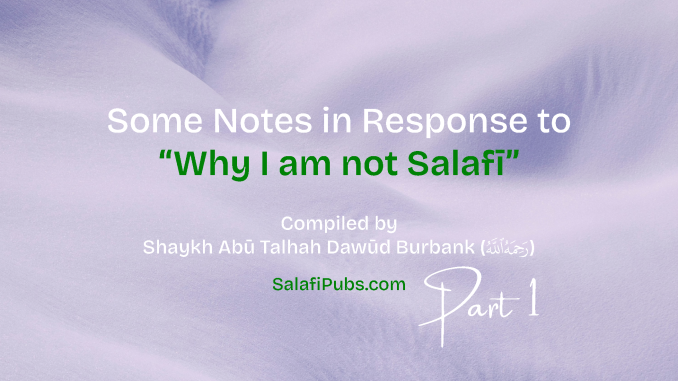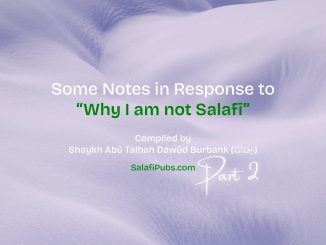
01. The Salafi Daʿwah with Respect to Other Jamāʿahs
Imām Nāsir-ud-Dīn Al-Albānī (may Allāh have mercy on him) said: “I will say a true word after which no Muslim can argue after the truth appears to him.
[firstly] — The Salafī daʿwah is an ascription to what? ‘Salafī’ is an ascription to the ‘Salaf’ (pious predecessors), so we have to know who the Salaf are and then what this ascription means and its importance as regards its meaning and implication.
The Salaf are the people of the first three generations whom the Messenger of Allāh (Peace and blessings be upon him) declared to be good in the authentic and mutawātir[1] hadīth recorded in Al-Bukhārī and Muslim and others from a group of the Companions that he said: “The best of people is my generation, then those who come after them, then those who come after them.”
I.e., the first three generations. So the Salafīs attach themselves to the Salaf, and if we know the meaning of ‘Salaf’ and ‘Salafī’ then we should bear two things in mind.
That this attachment is not to a single person or persons, as is the case with other Jamāʿahs present in the Muslim world. This is not an attachment to a person or even tens of people, but to that which will not err, since it is impossible that the Salaf would unite upon error, as opposed to the people of later times, since with regard to the later generations, there is no text speaking in their favour; rather, in general, they are spoken ill of in the end of the previous hadīth: “Then there will come a people who give witness and their witness is not asked for…”
And in other ahādīth there occurs: “A group of my Ummah will not cease to be upon the truth…”
So this is a praise for them but a censure of the rest since the praise is for a particular small group. Linguistically, ‘Tāʾifah’ is used to refer to a single person or more.
Thus if we understand this meaning of the ‘Salafīs’ and that they attach themselves to the Salaf — and that if the Muslim clings to that which the Salaf were upon — then here we come to the second matter:
[secondly] — That after this is understood, it is not possible for any Muslim but to be a Salafī, since we have understood that in attaching oneself to the Salaf one has attached himself to that which cannot err. This is taken from the hadīth: “My Ummah will not unite upon error,” and it is not correct to refer this to the people of later ages; those present today.
In addition to that is the ahādīth referring to what happened to the previous peoples — the Jews and the Christians — and what will befall the Muslims, regarding splitting into sects, saying: “The Jews split into seventy-one sects and the Christians into seventy-two, and my Ummah will split into seventy-three sects. All of them are in the Fire except one.”
The Companions said: “Who are they, O Messenger of Allāh?” He (Peace and blessings be upon him) replied: “They are the Jamāʿah.”
This shows who is meant in the previous hadīth: “My Ummah will not unite upon error”, since they are the saved sect, along with those who have their outlook and follow them.
Those Salaf-us-Sālihīn are those whom Allāh has warned us against opposing them or against following a way other than theirs, saying:
وَمَن يُشَاقِقِ الرَّسُولَ مِن بَعْدِ مَا تَبَيَّنَ لَهُ الْهُدَىٰ وَيَتَّبِعْ غَيْرَ سَبِيلِ الْمُؤْمِنِينَ نُوَلِّهِ مَا تَوَلَّىٰ وَنُصْلِهِ جَهَنَّمَ ۖ وَسَاءَتْ مَصِيرًا
[meaning] “If anyone contends with the Messenger even after guidance has been plainly conveyed to him, and follows a path other than that becoming to men of faith, We shall leave him in the path he has chosen, and land him in Hell – what an evil refuge!” — Sūrah an-Nisāʾ (4): 115
I have many times pointed out to our brothers the wisdom of our Lord’s attaching in this ayah ‘the following of a way other than that of the believers’, to ‘the opposing of the Messenger’, what is the wisdom in that, since even if the ayah did not contain the part about following a way other than that of the believers, then the first part about opposing the Messenger (Peace and blessings be upon him)) would have been enough to earn the person the evil end mentioned; however, it is not possible that the second part has no relevance, and we seek Allāh’s refuge from such a thing.
Its wisdom is shown by Imām Ash-Shāfiʿī’s using it as a proof of Ijmāʾ — meaning: ‘He who takes a way other than that of the Companions’ — who are unerring — and they and those who follow them are the Jamāʿah whom the Messenger of Allāh (Peace and blessings be upon him)) declared to be the saved sect.
They are those whom it is not permissible to oppose — for one who wishes to be saved from Allāh’s punishment on the Day of Resurrection. Therefore the Muslims have to be aware today, who are the Muslims mentioned in this ayah? And then, what is the wisdom in Allāh’s intending the Salaf-us-Sālih and those who follow them?
The answer has preceded and is, in brief, that they are the Companions who were present when the revelation came down, and who took it direct from the mouth of the Messenger (Peace and blessings be upon him). They saw the Messenger (Peace and blessings be upon him) living among them following the revealed rulings of the Qurʾān, many of whom were explained by his (Peace and blessings be upon him) sayings.
However, the later peoples do not have this excellence — that they heard the Qurʾān and the Sunnah direct from his mouth – nor did they see how he (Peace and blessings be upon him)) followed the texts of the Qurʾān and the Sunnah his practice, and from the wisdom is his (Peace and blessings be upon him) saying: “Being informed is not like seeing for yourself.”
So those who did not see him are not like his Companions who saw him and heard his words directly and saw how he acted.
Today there is a very nice saying which some people are distinguished by — but it would be nicer if put into practice. They say in their speeches and lectures: “that it is upon us to make Islām take practical shape upon the earth.” However, if we do not understand Islām, and understand it according to the understanding of the Salaf-us-Sālih, then we cannot put this saying into practice. But those who were able to do that were the Companions of the Messenger (Peace and blessings be upon him)) due to the two reasons that we have mentioned:
[a] — That they heard his words directly and therefore their retention of it is better than ours;
[b] — Then there are affairs which need explanation through his (Peace and blessings be upon him)) action, and they saw that.
I will give you a very clear example. There are some ayāt in the Qurʾān which a Muslim cannot understand unless he knows the Sunnah, which explains the Noble Qurʾān, as Allāh (the Most High) says:
وَأَنزَلْنَا إِلَيْكَ الذِّكْرَ لِتُبَيِّنَ لِلنَّاسِ مَا نُزِّلَ إِلَيْهِمْ
[meaning:] “We have revealed the Reminder to you in order that you may explain to the people what has been revealed to them.” — Sūrah an-Nahl (16): 44
Allāh (the Most High) saying:
وَالسَّارِقُ وَالسَّارِقَةُ فَاقْطَعُوا أَيْدِيَهُمَا
[meaning:] “The male and the female thief: Cut off their hands” — Sūrah al-Māʾidah (5): 38
Let us produce the Sībawaih[2] of this age and let him explain this ayah. Language wise he will not be able to define the ‘sāriq’ (thief) nor the ‘yad’ (hand). Who is the thief whose ‘yad’ is to be cut? What is the ‘yad’ that should be cut? He cannot answer!
In the language, anyone who steals even an egg is a thief, and the ‘yad’ goes right up to the shoulder. The answer lies in the ayah mentioned previously:
وَأَنزَلْنَا إِلَيْكَ الذِّكْرَ
[meaning:] “We have revealed the Reminder to you.” — Sūrah an-Nahl (16): 44
The answer is found in the explanation of the Messenger (Peace and blessings be upon him) for the Qurʾān. That explanation is found in the practice — for this and for many other āyāhs. He who reads the ‘science of Usūl’ finds that there is ‘General and Particular’, ‘Unrestricted and Restricted’ and ‘Abrogating and Abrogated’ texts — comprehensive words under which come tens if not hundreds of texts, general texts restricted by the Sunnah — and I will not prolong this further in order to answer the rest of the questions.
2.On Ascription to the Salaf.[3]
Imām Nāsir-ud-Dīn Al-Albānī (may Allāh have mercy on him) said: “However, there are some who claim knowledge who deny this ascription, claiming that it has no foundation, saying: “It is not permissible for a Muslim to say: ‘I am Salafi.’”
And it is as if he is saying: “It is not permissible for me to say: ‘I am following the Salaf-us-Sālih in what they were upon in ʿaqīdah, worship and manners!’”
And there is no doubt that the likes of this denial — if that is what is meant — implies that he is disassociating himself from the correct Islām that the Salaf-us-Sālih were upon… Thus it is not permissible for a Muslim to disassociates himself from being ascribed to the Salaf-us-Sālih.
If, however, he freed himself from any other nisbah (ascription), then none of the people of knowledge could accuse him of disbelief or sinfulness; however, the one who refuses calling himself with this name Salafi, then it should be seen, does he attribute himself to a particular madhhab — whether in matters of ʿaqīdah or fiqh.
So perhaps he will call himself an Ashʿarī or a Mātarīdī, or he may be from Ahlul-Hadeeth, or a Hanafī, Mālikī, Shāfiʿī or Hanbalī — from those matters which enter into the term Ahlus-Sunnah wal-Jamāʿah.
Despite that fact that the one who ascribes himself to the Ashʿarī madhhab, or the four well-known madhhabs, then he has ascribed himself to those who are not protected from making mistakes as individuals — even though there are from them Scholars that attain what is correct.
So why O why do they not reject the likes of these ascriptions to individuals who are not protected from mistakes?
However, as for the one who ascribes himself to the Salaf-us-Sālih collectively — then he ascribes himself to that which is protected from mistakes.”
Translated by Abū Ṭalḥah Dāwud Burbank.
[1] Those ahadīth reported by a huge number of people at every stage of transmission.
[2] A great scholar of the Arabic language of early times.
[3] Taken from Al-Assālah Magazine 9/87.




Be the first to comment